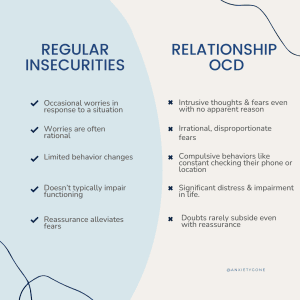Additional factors, such as having an anxious attachment style, past negative experiences, and low self-esteem can also play a role in relationship anxiety.
Types of Relationship OCD
There are two types of Relationship OCD. Some people only experience one or the other, where others may deal with both.
- Relationship-focused OCD: This type revolves around doubts directly related to the relationship, such as “Does my partner genuinely love me?” or “Am I truly invested in this relationship?”
- Partner-focused ROCD: This type of relationship OCD centers on concerns regarding the partner’s traits and characteristics. Individuals may obsess over various aspects, such as personality, intelligence, and other qualities of their significant other, despite having clear feelings for their partner.
Examples of Relationship Obsessive Compulsive Disorder
Relationships are an important aspect of our lives. We have them to bring us happiness, fulfillment and yes, challenges too. challenges. However, for some people, these challenges can escalate into a persistent and distressing pattern of doubt and anxiety known as Relationship Obsessive-Compulsive Disorder (ROCD).
Below are some example situations of what relationship OCD looks like in different situations.
1. Constant Relationship Doubts
Sarah is in a happy relationship with her current partner, but she can’t shake the feeling that something is wrong. She spends hours analyzing every interaction they’ve had, wondering if her partner truly loves her or if the relationship is doomed to fail.
2. Reassurance Seeking
Mark finds himself constantly seeking reassurance from his friends and family about his relationship. He texts his friends multiple times a day, asking if they think his current partner is the right one for him, desperately seeking validation for his doubts.
3. Compulsive Behaviors
Every time Maria’s romantic partner leaves the house, she feels compelled to check their phone to make sure they’re not talking to someone else. She knows it’s irrational, but the fear of infidelity consumes her thoughts until she gives in to the compulsion.
4. Comparison
Jake’s ROCD manifests as constant comparison between his romantic partner and his exes. He can’t help but measure his current relationship against past ones, obsessing over whether his partner measures up in terms of looks, intelligence, and personality.
5. Fear of Making the Wrong Decision
Emily is paralyzed by the fear of making the wrong decision about her relationship. She agonizes over whether her partner is “the one,” constantly second-guessing herself and worrying that she’ll end up unhappy if she stays in the relationship.
These examples illustrate how ROCD can manifest in various ways, but they all share the common theme of intrusive doubts and anxieties about relationships.
Living with Relationship Obsessive-Compulsive Disorder (ROCD) can feel like being trapped in a never-ending cycle of doubt and anxiety . Every aspect of the relationship becomes scrutinized, from the authenticity of your feelings to the suitability of your partner. It’s like having a relentless voice in your head, constantly whispering fears and uncertainties, leaving you feeling on edge and unable to find peace.
The constant questioning and need for reassurance can take a toll on your mental health, leading to feelings of stress, guilt, and inadequacy. It’s a rollercoaster of emotions, swinging from moments of intense love and connection to overwhelming doubt and fear.
Ultimately, it can leave you feeling emotionally exhausted and isolated, longing for relief from the relentless grip of anxiety.
Strengthen Your Bond Today
Relationships can be challenging — but with the right tools, you and your partner can heal, reconnect, and grow stronger together.
Our Ritual couples therapy creates a safe, supportive space to reignite your bond and improve communication.
Take the first step toward a more loving, fulfilling relationship today.
Free Assessment
How Relationship OCD Affects Relationships
Relationship Obsessive-Compulsive Disorder (ROCD) can significantly impact your relationships, creating a ripple effect that touches every aspect of your interactions with your partner. Constant doubts and fears about the relationship’s authenticity and future can lead to increased anxiety and distress for the both of you, making it challenging to connect with your partner on a deep emotional level.
This can result in increased conflict, as reassurance-seeking behaviors and compulsive rituals may strain the relationship dynamics. Research also found partner-focused relationship OCD symptoms can lead to decreased relationship satisfaction and intimacy ).
Additionally, people with OCD may struggle to trust their romantic partner, leading to difficulties in forming secure attachments and maintaining a sense of closeness. It can also lead up unhealthy attachment insecurities.
Do I Have Relationship OCD?
Perhaps these signs and symptoms of Relationship Obsessive-Compulsive Disorder (ROCD) sound familiar to you and are wondering if you have relationship OCD. While, a diagnosis can only be made by a qualified professional, recognizing the signs is the first step toward finding relief and building healthier relationships.
Here are some questions to ask yourself:
- Do you find yourself constantly questioning the authenticity of your feelings or the strength of your relationship?
- Are you constantly seeking reassurance from your partner, friends, or family about the status of your relationship?
- Do you frequently compare your current relationship to past ones or to other people’s relationships? .
- Does thinking about your relationship cause you significant distress or anxiety? Experiencing intense feelings of fear, guilt, or discomfort related to your relationship could be indicative of ROCD.
- Is your preoccupation with your relationship interfering with your daily functioning or causing problems in other areas of your life?
- Do you find yourself overanalyzing every interaction and conversation with your partner, searching for hidden meanings or signs of trouble?
- Are you constantly worried that your partner will leave you or find someone better, despite evidence to the contrary?
- Do you feel compelled to monitor your partner’s actions, such as checking their phone or social media accounts, to ease your anxiety about the relationship?
- Do you struggle with uncertainty about the future of your relationship, feeling a need to have everything planned out and under control?
- Do you experience intense guilt or shame when experiencing doubts or negative thoughts about your relationship, feeling like you’re betraying your partner?
- Do you hold your relationship to impossibly high standards, feeling like anything less than perfection is a failure?
- Do you avoid certain situations or activities with your partner out of fear that they will trigger your obsessive thoughts or anxieties?
- Do you find it difficult to stop thinking about your relationship worries, even when you try to distract yourself or focus on other things?
- Do you experience physical anxiety symptoms such as headaches, stomachaches, or muscle tension related to your relationship anxieties?
- Do you find that your self-esteem is closely tied to the status of your relationship, feeling worthless or unlovable when experiencing doubts or conflicts?
Reflecting on these questions can provide further insight into whether your experiences align with ROCD. If you find that many of these patterns resonate with you, it may be beneficial to seek support from a a mental health professional experienced in treating OCD for further evaluation and guidance.
advertisement
Ready to Talk? Find Your Perfect Online Therapist Now!
Anxiety is treatable with therapy, and BetterHelp offers a convenient and affordable solution. With over 20,000 licensed therapists available, BetterHelp provides accessible care, starting at just $65 per week. Take a free online assessment today to get matched with the right therapist for you.
Free Assessment
How is ROCD treated?
Treating Relationship Obsessive-Compulsive Disorder (ROCD) involves a combination of therapeutic approaches, self-help strategies, and, in some cases, medications. Each individual’s experience with ROCD is unique, so a personalized treatment plan is essential for effective management.
Here, we explore various treatment options that can help those struggling with ROCD lead healthier, more fulfilling lives.
1. Cognitive-Behavioral Therapy (CBT)
Cognitive-Behavioral Therapy (CBT) is highly effective in treating ROCD. It helps individuals identify and challenge irrational thoughts and develop healthier behavioral responses. A key component, Exposure and Response Prevention Therapy (ERP), involves gradually confronting anxiety-provoking thoughts while refraining from compulsive behaviors.
This therapy helps individuals challenge and change their obsessive thoughts and compulsive behaviors.
2. Exposure and Response Prevention Therapy (ERP)
Exposure and Response Prevention Therapy (ERP) is a highly effective treatment for Relationship Obsessive-Compulsive Disorder (ROCD) It involves identifying and gradually exposing individuals to anxiety-provoking thoughts and situations related to their relationship, such as doubts about their partner’s love or fears of relationship failure, without allowing them to engage in compulsive behaviors like seeking reassurance or avoiding certain situations. By consistently practicing this exposure and preventing compulsive responses, individuals learn to tolerate uncertainty and reduce their anxiety over time. Despite initial discomfort, ERP helps break the cycle of obsessions and compulsions, enhances daily functioning, and builds resilience, making it a crucial component of ROCD treatment.
3. Medications for ROCD
Medications play a crucial role in managing Relationship Obsessive-Compulsive Disorder (ROCD), particularly for those with moderate to severe symptoms. Selective Serotonin Reuptake Inhibitors (SSRIs), such as fluoxetine (Prozac), sertraline (Zoloft), and escitalopram (Lexapro), are commonly prescribed. These medications help balance serotonin levels in the brain, reducing the intensity and frequency of obsessive thoughts and compulsive behaviors.
Often, medications are used in conjunction with therapies like Cognitive-Behavioral Therapy (CBT) or Exposure and Response Prevention (ERP) to enhance overall treatment effectiveness and improve quality of life for individuals with ROCD.
Self-Help Strategies for Managing ROCD
Self-help strategies are vital in managing Relationship Obsessive-Compulsive Disorder (ROCD) alongside professional treatment. These strategies empower individuals to take control of their symptoms and improve their mental well-being:
1. Mindfulness Practices
Techniques such as meditation and deep breathing exercises help you stay present, reducing the power of the obsessive thoughts. Mindfulness encourages non-judgmental awareness of thoughts and feelings, helping you respond more calmly to anxiety triggers.
The Mindfulness app offers guided meditations, stress relief techniques, and personalized plans to help you stay calm and focused. For a limited time, enjoy an exclusive discount just for our readers!
2. Journaling
Keeping a journal provides valuable insights into thought patterns and emotional responses . Writing down obsessive thoughts and related feelings can help you recognize triggers and develop healthier coping mechanisms.
By externalizing thoughts, journaling also provides clarity, reduces mental clutter, and promotes a sense of control. Additionally, it can serve as a therapeutic outlet for expressing emotions and tracking progress over time, further reducing anxiety and enhancing your overall mental illness and mental health.
Consider picking up some OCD journals for guidance through specific prompts and healing exercises.
3. Healthy Lifestyle
Maintaining a healthy lifestyle is a vital for managing Relationship Obsessive-Compulsive Disorder (ROCD). Regular exercise, a balanced anti-anxiety diet, and sufficient sleep can significantly improve mental health by reducing anxiety and enhancing mood.
Physical activity releases endorphins, which are natural stress relievers, while a nutritious diet supports brain function and emotional regulation. Adequate sleep is crucial for cognitive processes and emotional stability, helping to manage obsessive thoughts and compulsive behaviors more effectively. Together, these healthy habits foster resilience and well-being, providing a solid foundation for coping with ROCD.
4. Developing a Support System
Developing a support system is a crucial self-help strategy for managing Relationship Obsessive-Compulsive Disorder (ROCD) . Speaking with supportive friends, family, or joining support groups can give you the essential emotional backing and practical advice needed as you embark on this healing journey. Having someone to talk to can also help alleviate the burden of obsessive thoughts weighing on your mind and bring you some anxiety relief in times of need.
Sharing experiences with others who understand ROCD reduces feelings of isolation as well.
5. Stress Management Techniques:
Soothing practices like gentle yoga, progressive muscle relaxation, and hobbies that help you release stress will make it all that much easier to cope with ROCD symptoms. Yoga combines physical movement with deep breathing and mindfulness, promoting relaxation and mental clarity. Progressive muscle relaxation involves tensing and then slowly releasing each muscle group, reducing physical tension and anxiety. Engaging in hobbies and enjoyable activities provides a positive distraction, enhancing mood and reducing stress.
Here are some of our top recommendations:
How to Support a Partner with ROCD
With the right strategies and support, people with ROCD can lead fulfilling lives and maintain healthy relationships. Supporting a partner with ROCD involves patience, education, and clear communication. Here are some tips on supporting someone with relationship OCD.
Take the time to really listen to your partner’s concerns and fears without judgment. Let them express themselves freely, and validate their feelings.
Learn about ROCD so you can better understand what your partner is going through. Knowledge is power, and it can help you provide more effective support.
ROCD can be challenging, and recovery isn’t always straightforward. Be patient with your partner as they navigate their struggles, and avoid getting frustrated if progress is slow.
Reassure your partner of your love and commitment regularly. Remind them that ROCD thoughts are just that—thoughts—and don’t reflect the reality of your relationship.
- Encourage professional help
Encourage your partner to seek help from a therapist who specializes in OCD or Relationship Obsessive Compulsive Disorder. Therapy can provide them with the tools and support they need to manage their symptoms effectively.
Supporting a partner with ROCD can be emotionally taxing, so make sure to take care of yourself too. Set boundaries, engage in activities that bring you joy, and seek support from friends or a therapist if needed.
Collaborate with your partner to develop coping strategies and problem-solving techniques. Let them know that you’re in this together and that you’ll support them every step of the way.
Acknowledge and celebrate even the smallest victories along the way. Recognize the effort your partner is putting into managing their ROCD, and let them know that you’re proud of them.
Conclusion
Relationship Obsessive Compulsive Disorder (ROCD) can be a challenging and distressing condition, but it is important to remember that you are not alone, and help is available. By understanding ROCD, recognizing its symptoms, and seeking appropriate treatment, you can manage its impact on your life and relationships. Building a strong support system, practicing self-care, and maintaining open communication with your partner are key steps toward a healthier, happier relationship.
Overcoming ROCD requires patience, effort, and support, but many people and couples have successfully navigated this journey. With the right strategies and a compassionate approach, you too can achieve a fulfilling relationship despite the challenges posed by ROCD. Remember, seeking help is a sign of strength, and taking the first step towards understanding and managing ROCD is a positive move towards a brighter future.
Additional Resources
Ready to elevate your mental wellness? To help our readers thrive along their mental health journey, Anxiety Gone partners with leading experts in mental health and wellness field. Anxiety Gone may receive commission from the companies listed below at no extra cost to you.
Talk Therapy
Better Help offers access to over 20,000 licensed therapists available, starting at just $65 per week. Take a free online assessment today to get matched with the right therapist for you. Get Started
Virtual Psychiatry
Brightside Therapy offers anxiety and OCD treatment online from licensed psychiatric providers and therapists. No need to wait, start a free consultation online today. Get Started
Mental Health Newsletter
Join our free Anxiety Gone newsletter and receive helpful tips and expert advice delivered right to your inbox. Sign Up
Mindfulness Plus+
Unlock over 2,000 mindfulness practices created by experts within the mindfulness and meditation field, with daily practices designed to meet your unique needs and aspirations, this serves as your daily companion toward a more mindful existence. Get Started
Digital Breathwork Classes
Reduce stress and anxiety from home with guided breathing exercises, created by leading experts and breath work gurus. Start Your Free Trial
Mental Health Support
Access our list of mental health support lines and crisis hotlines and receive immediate access to professionals trained to help. Find a Helpline
Infographics











